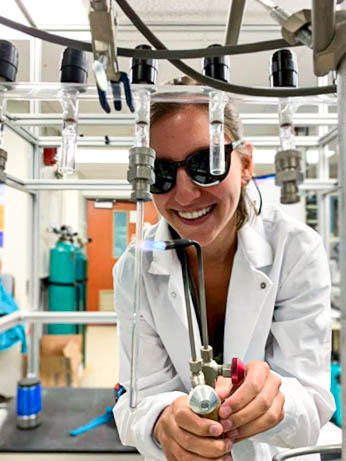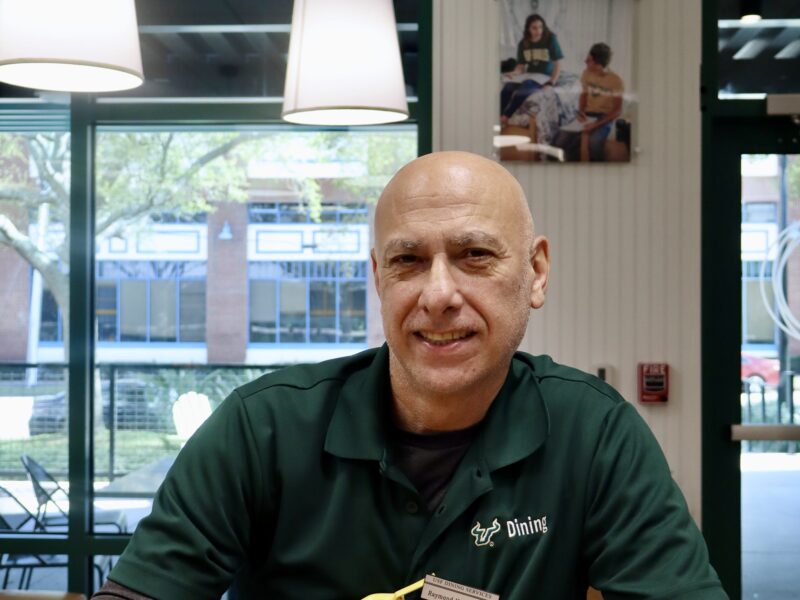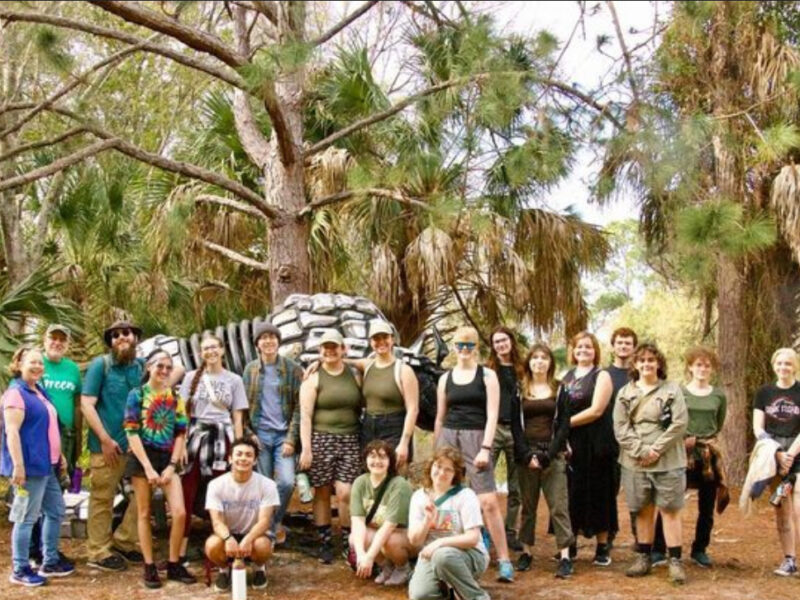
Courtesy of Carey Schafer
By Decker Lavely
Carey Schafer’s graduate research finds her waist deep in Florida waters, covered in mud and battling mosquitoes.
But you won’t find her only in the field or the laboratory. She’s also out in the community connecting people to science.
Schafer, 25, studies geological oceanography in the master’s program at the USF College of Marine Science in St. Petersburg. She was born in the suburbs of Kansas City, far from the ocean, but grew up loving science and wanting to be a marine biologist.
“As a kid, I was really curious, always asking questions, and when I had a good science teacher that was the best thing,” Schafer said.
Once she got to college, she gravitated more toward earth science and earned a bachelor’s degree in environmental science from Tulane University in New Orleans. There, she conducted research on how rivers are impacted by wildfires and had an internship with NASA, studying air quality.
She learned about the USF College of Marine Science during an American Geophysical Union conference she attended for her internship. She learned the college would allow her to explore her interests in both earth and marine science.
“The College of Marine Science was just a great program with… a great community when I came and visited,” she said.
Today, her research focuses on how mangroves store and cycle carbon. The scientific community knows how much carbon mangroves can store, Schafer said, but not necessarily how long.
“Is protecting mangroves really important for mitigating increased carbon dioxide emissions? Or are they storing carbon for a short amount of time and releasing it as carbon dioxide, or is it being washed away into the ocean?” Schafer said.
“I’m trying to get at how long the carbon is being stored there, and is it stable? Especially along the Florida coastline, we need to know if mangroves are going to continue to be stable into the future.”
Ten Thousand Islands in southwest Florida is the site for most of Schafer’s field work. She goes out into the water with a group from the Florida Fish and Wildlife Research Institute.
“I take sediment cores, and we carry them all out with us and bring them back to the lab and analyze all of them,” Schafer said.
Recently, she was awarded the St. Petersburg Downtown Partnership Fellowship in Coastal Science for 2019-2020 to finance her tuition and research. Last year, she was awarded the Paul Getting Endowed Memorial Fellowship in Marine Science.
Though Schafer enjoys her mangrove research, outreach is one of her biggest passions.
“With research it’s great; you’re piecing together a puzzle and trying to find the answer,” Schafer said. “But outreach is where I want to go with my career.”
She helped found the St. Petersburg chapter of Taste of Science, an organization that teaches community members about science by connecting them with professionals.
“We bring professors, researchers, anyone who is involved in science to areas in St. Petersburg – whether that’s a coffee shop, brewery or community center – and have them give talks and interact with people in the community,” Schafer said. “We are making science seem less intimidating and making scientists seem more like (regular) people, which they are.”
Her outreach extends to the Saturday Morning Market in downtown St. Petersburg.
Schafer established a partnership between the market and the College of Marine Science. Once a semester, the college has a booth to teach community members about scientific issues.
For the past two years, Schafer has also been a part of the Oceanography Camp for Girls, a three-week summer program established in 1991 that encourages girls to pursue science careers by exploring different scientific topics.
“Being a woman in STEM, I want to make sure we are funneling more girls into the science pipeline,” Schafer said. “I really love that Oceanography Camp for Girls is free, and because of that you open it up to girls from every socioeconomic status. Anyone can participate, which I think is great.”
Schafer helped lead labs and field trips for the camp. During one trip to Fort De Soto Park, she was able to develop curriculums and teach the girls about mangroves.
“The thing I love about outreach is that not everyone gets to experience science, and those experiences can be so life changing.”
In the future, Schafer hopes to develop more programs like the camp for girls around the country and work in science policy.
“If we, as a scientific community, take the time to start educating people on why science matters and how they should seek out information and start critically thinking, then that will start to be reflected in the political realm,” she said.



Love her perspective on the importance of outreach and making science accessible for all!